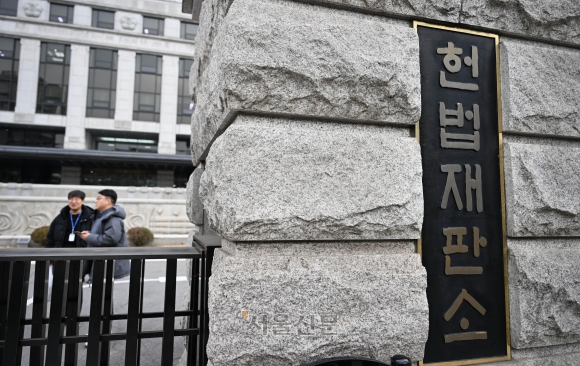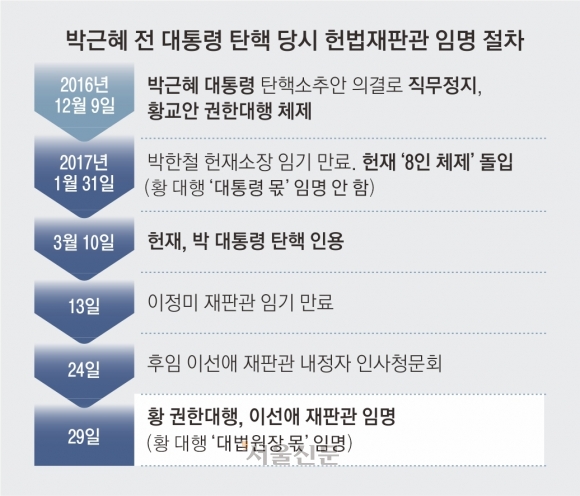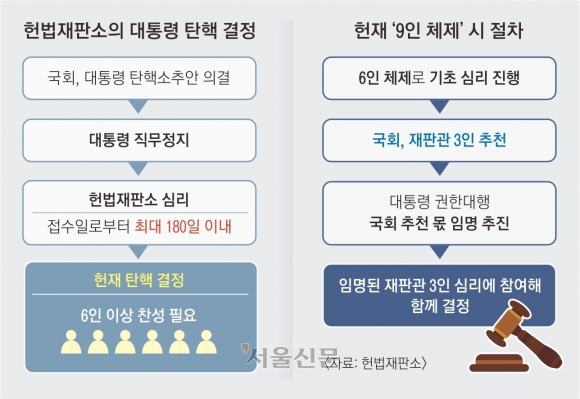Ahead of the Impeachment Trial: Constitutional Court Judge Nomination Procedure as a Variable, Recommendation of 1 People’s Power and 2 Democratic Candidates
Diverging Opinions on the Scope of Acting President’s Authority in Legal Circles
“Status Quo” vs “Actions Beyond Authority”
Legitimacy Debate Over Constitutional Court’s ‘6-Member System’
Hwang Appoints 1 Judge Under Chief Justice’s Authority
President’s Share Successor Not Appointed,

The Constitutional Court received the impeachment resolution against President Yoon Suk-yeol from the National Assembly and held its first judge meeting on the 16th to begin formal trial procedures. The court plans to hold the first preparatory hearing on the 27th, inviting representatives from the National Assembly and President Yoon’s side to provide opinions. The photo shows the Constitutional Court in Jongno-gu, Seoul, on the morning of the day. Hong Yoon-ki reporter,
,
, ‘With the impeachment trial of President Yoon Suk-yeol initiated following the passing of the impeachment bill, the three vacant positions for Constitutional Court judges have become a new variable. The Democratic Party and the People’s Power, holding the power to recommend judges for these vacant positions, submitted their recommendations to the National Assembly, each with 2 and 1 candidate respectively. If a bipartisan agreement is reached, it is expected that President Hwang Kyo-ahn, acting as Chief Justice, will appoint the new judges. However, some legal circles argue that this exceeds the acting president’s authority. The possibility that the follow-up appointment procedures may not proceed smoothly due to bipartisan conflict cannot be ruled out. As attention focuses on whether the ‘9-member system’ of the court can be realized, if the filling of the vacant judge positions is delayed, it will be difficult to proceed from the current ‘6-member system’ to deciding on the impeachment of President Yoon.’,
,
, ‘On the 16th, Yoon Jong-geun, spokesperson of the Democratic Party, met with reporters at the National Assembly and said, “We are urging the People’s Power to conduct a swift personnel hearing aiming for processing at the plenary session on the 30th.” A member of the People’s Power’s Special Committee on Personnel Hearings for Constitutional Court Judges stated, “We intend to complete the personnel hearing by the 27th.” Previously, the Democratic Party recommended Jung Gye-seon, President of Seoul Western District Court, and Ma Eun-hyuk, Chief Judge of Seoul Western District Court, while the People’s Power recommended lawyer Jo Han-chang.’,
,
, ‘ MobileAdNew center ‘,

,
,
, ‘However, the People’s Power sensed turbulence by issuing a notice contradicting a media report claiming that the ruling and opposition parties had tentatively agreed to conduct personnel hearings for the three constitutional court judges, who will decide on President Yoon’s removal, on the 23rd and 24th. If the candidates pass the personnel hearings through bipartisan agreement, Acting President Hwang’s decision will draw attention. Politically, it is generally expected that Hwang will not refrain from appointing the judges who passed the hearings. Since the three judges are ‘selected by the National Assembly’ share, it is assumed that Acting President Hwang would have no burden in proceeding with the appointment.’,
,
, ‘On the other hand, legal circles are divided. The crux of the matter is the scope of the acting president’s duties. Article 71 of the Constitution stipulates that ‘if the president is absent or unable to perform his duties due to an accident, the prime minister and a designated state council member shall act in order of protocol as stipulated by law’, but does not explicitly mention the scope or limits. However, the dominant interpretation is that the acting president’s duties are limited to ‘the minimum maintenance of the status quo’ necessary for national governance and administration.’,
,
, ‘The prevailing view is that the acting president can exercise the authority to appoint judges recommended by the National Assembly. Shin Bong-ki, a professor at Kyungpook National University Law School, explained, “While appointing a constitutional court judge within the president’s share requires the president’s active discretion and exceeds the scope of the acting president’s duties, appointing judges under the National Assembly’s recommendation is a passive action of accepting the recommendation, and thus falls under maintaining the status quo.” Cha Jin-a, a professor at Korea University Law School, also stated, “Appointing judges under the National Assembly’s share is seen more as an extension of the current government’s activities than an exercise of authority as the head of state, so it is possible.”‘,
,
, ‘ MobileAdNew center ‘,

,
,
, ‘However, since a significant number of judge appointments will handle the impeachment verdict for the president this time, it is difficult to interpret this as merely maintaining the status quo. Sungkyunkwan University Law School Professor Ji Seong-woo argued, “Allowing the acting president to exercise appointment authority for the three judges in question, which could sway the decision direction of the constitutional court, constitutes a change of status action.” He added, “Leaving a precedent where the opposition hurriedly fills in missing judges only when needed poses a substantial concern from the rule of law perspective.” ‘,
,
, ‘Indeed, similar controversies arose during the impeachment phase of former President Park Geun-hye. Following the impeachment resolution against Park on December 9, 2016, Hwang Kyo-ahn, the then prime minister, initiated an acting president system. Throughout the ongoing impeachment trial, the term of then Constitutional Chief Justice Park Han-chul ended on January 31, 2017. After the impeachment against President Park was legally upheld on March 10, Justice Lee Jung-mi’s term ended on March 13. After extensive legal debate, Acting President Hwang did not appoint a successor for the ‘presidential share’ incumbent of Chief Justice Park, whereas he appointed the newly recommended Justice Lee Sun-ae, who was under the recommendation share of the Chief Justice, on March 29. ‘,
,
, ‘There is some discussion about proceeding with the impeachment trial under the ‘6-member system’ without appointing new judges, but concerns about legitimacy are unavoidable. Lee In-ho, a professor at Chung-Ang University Law School, emphasized, “The trial for the president’s removal differs in weight as it annuls a sovereign decision made in elections, so psychology and decisions must be made by a complete 9-member panel to ensure constitutional legitimacy.” ‘,
,
, ‘The possibility that the impeachment trial could be prolonged until April 19 next year without reaching a conclusion poses another variable. On April 18 next year, the terms of Acting President Moon Hyeong-bae and Justice Lee Mi-sun of the Constitutional Court will end, and since these judges are ‘presidential appointed shares,’ it is assumed that Acting President Hwang would find it challenging to appoint their successors. Korea University Law School Professor Jang Young-soo mentioned, “Appointing successors to the president’s share of judges involves active action, which could complicate matters significantly.”

